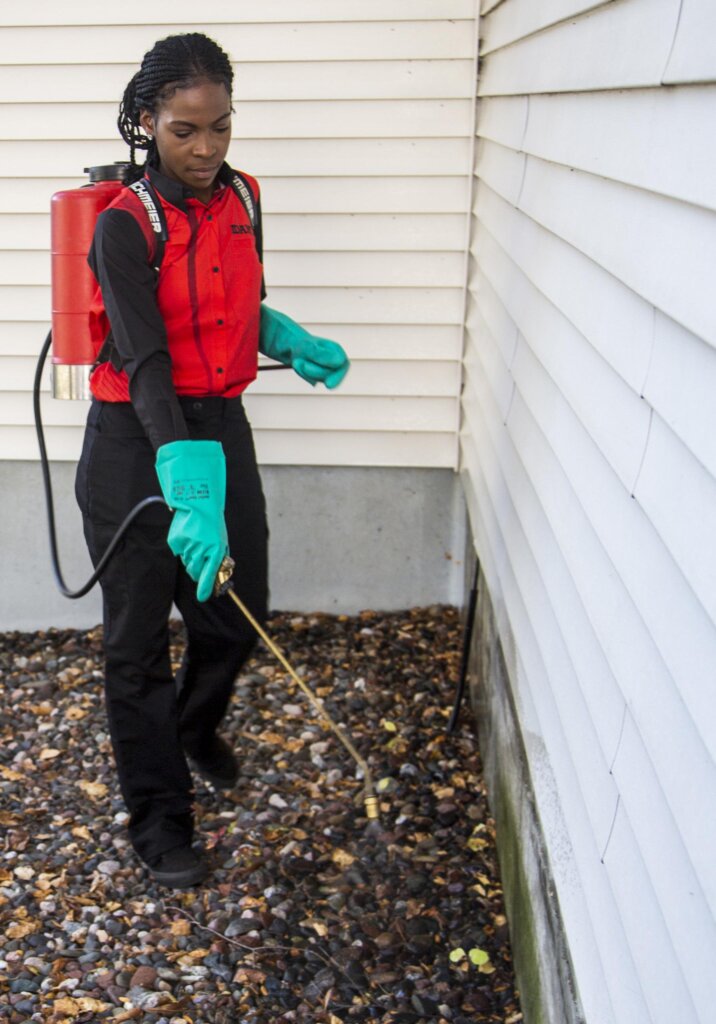A1 Residential Pest Control Portland OR Bed Bugs - Safeguard Your Home
A1 Residential Pest Control Portland OR Bed Bugs - Safeguard Your Home
Blog Article
Efficient Parasite Control Services: An Extensive Appearance at Elimination Techniques and Avoidance Measures
In the world of pest control solutions, the effective administration of invasions calls for a meticulous strategy that incorporates numerous methods and actions for both eradication and prevention. From Integrated Insect Management (IPM) strategies that prioritize sustainable remedies to chemical extermination strategies created for targeted removal, the toolbox versus bugs is large and multifaceted.

Integrated Bug Management (IPM) Techniques
Integrated Parasite Monitoring (IPM) Techniques include a detailed strategy to pest control that concentrates on avoidance, tracking, and control approaches to effectively handle parasite populations. By incorporating numerous strategies, IPM intends to minimize the impact of bugs while also minimizing the reliance on chemical pesticides. Prevention exists at the core of IPM, emphasizing methods like proper hygiene, upkeep of hygiene, and securing access factors to discourage bugs from infesting buildings. Monitoring plays a crucial function in IPM by frequently recognizing and evaluating bug degrees to determine the suitable treatment limits. Control approaches in IPM prioritize using physical, biological, and social approaches before transforming to chemical therapies as a last resource. These strategies include presenting natural killers, habitat modification, and utilizing trapping devices to keep pest populaces in check. Generally, IPM fosters a ecologically aware and lasting technique to pest management, promoting long-term remedies that safeguard both human health and wellness and the ecosystem.
Chemical Extermination Strategies
Chemical extermination strategies are commonly used in insect control services to successfully eradicate bug populaces that pose a danger to human wellness and residential property. These techniques involve the use of various chemical compounds particularly made to target and get rid of pests such as insects, rats, and various other undesirable animals. The application of chemicals, pesticides, rodenticides, and various other chemical representatives is very carefully regulated to guarantee optimum efficiency while decreasing threats to human beings, family pets, and the setting.
One of the vital advantages of chemical extermination strategies is their capacity to offer fast and targeted outcomes, making them particularly valuable in cases of serious problems or immediate pest control demands - a1 portland pest control bed bugs. However, it is vital to highlight the relevance of correct handling, application, and disposal of these chemical items to avoid unintentional harm
In addition, integrated bug management (IPM) approaches often combine chemical elimination techniques with various other methods such as sanitation, habitat modification, and organic controls to develop a sustainable and comprehensive bug control approach. By incorporating chemical extermination methods judiciously within an IPM structure, parasite control solutions can efficiently take care of insect populaces while lessening potential dangers to human health and the environment.
Biological Insect Control Approaches
Using natural killers and bloodsuckers to take care of pest populations is a sustainable approach understood as organic pest control. This approach uses the natural mechanisms of the community to regulate parasite populations without depending on synthetic chemicals. One common biological control method involves presenting all-natural enemies of the target pest species, such as ladybugs for aphid control or nematodes for termite invasions. These all-natural predators prey on the pests, assisting to keep their populaces in check.
Another efficient biological control technique is making use of microbial pesticides. These are normally occurring microorganisms, such as infections, microorganisms, and fungis, that especially target and contaminate particular bug species. By using useful source these microbial agents, parasite populations can be successfully minimized without creating or harming useful microorganisms damage to the atmosphere.
Physical Insect Avoidance Steps
Applying physical parasite prevention steps includes making use of barriers and structural alterations to prevent pests from getting in or infesting a home (a1 residential pest control portland or bed bugs). One efficient technique is securing all prospective access points such as gaps around doors, home windows, and utility infiltrations. Mounting door moves, screens on windows, and sealing cracks in the foundation can assist stop insects like insects and rodents from getting indoors. Additionally, preserving a clean and clutter-free atmosphere is important as parasites are attracted to food resources and concealing places. Consistently evaluating and repairing any kind of broken screens, vents, or roof tiles can also assist in keeping insects out.
Another physical prevention action is the usage of obstacles like fencing to maintain larger pests such as deer or raccoons far from the home. Mounting mesh or wire displays around gardens can safeguard plants from being harmed by bugs. Correct waste management, consisting of this page safeguarding trash bin with tight-fitting lids, is necessary in deterring pests like raccoons, bugs, and rats. By implementing these physical bug avoidance measures, property owners can significantly decrease the risk of pest problems and the damage they can cause.
Specialist Parasite Evaluation Treatments
Carrying out complete and systematic bug examinations is an essential aspect of expert insect management procedures. Specialist parasite assessors are educated to diligently take a look at buildings for indicators of problems, determining pest varieties, entry points, and conducive conditions.

Verdict
Finally, efficient pest control solutions utilize a range of techniques, consisting of Integrated Pest Monitoring techniques, chemical extermination techniques, organic controls, and physical prevention measures. Specialist insect evaluation treatments play an important role in recognizing and resolving pest issues in a timely way. By applying a combination of these approaches, homeowner can effectively manage and stop parasite problems.
From Integrated Insect Management (IPM) approaches that prioritize sustainable solutions to chemical extermination strategies designed for targeted elimination, the toolbox against parasites is huge and complex.Integrated Insect Management (IPM) Strategies encompass an extensive method to pest control that focuses on surveillance, control, and avoidance methods to properly handle pest populations.Chemical elimination strategies are generally employed in pest control services to effectively over here remove parasite populations that pose a threat to human health and building.Using all-natural killers and bloodsuckers to manage parasite populations is a sustainable approach understood as biological parasite control.In conclusion, effective pest control solutions employ a variety of strategies, consisting of Integrated Insect Administration strategies, chemical elimination approaches, organic controls, and physical prevention steps.
Report this page